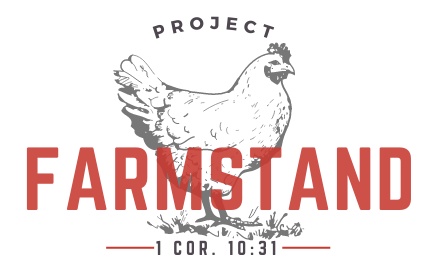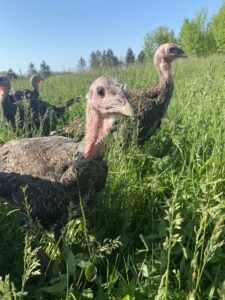Introduction
In an era when conscious choices about food and farming practices are becoming increasingly important, pasture-raised poultry fed with non-GMO organic feed has emerged as a beacon of sustainability and nutrition. Not only do these practices result in healthier and more flavorful poultry products, but they also play a vital role in improving soil quality and supporting regenerative farming. In this blog, we will explore the health benefits of pasture-raised poultry for the human body and its contribution to restorative and regenerative farming practices, emphasizing the importance of non-GMO organic feed.
The Resurgence of Restorative Farming
Restorative farming practices aim to revitalize the land and foster thriving ecosystems. This approach prioritize soil health, biodiversity, and sustainable land management. At the core of these practices is the belief that farming should go beyond mere production and focus on nurturing the earth. Pasture-raised poultry and their dietary choices align perfectly with these principles.
The Role of the Microbiome in the Soil
The health of the soil microbiome is a critical component of sustainable and restorative farming. Healthy soil teeming with beneficial microorganisms fosters nutrient-rich pastures. When pasture-raised poultry forage on such pastures, they consume a diverse range of plant matter, insects, and microorganisms. This dietary diversity contributes to a more balanced microbiome within the birds themselves.
The Role of the Microbiome in People
The microbiome, a vast community of microorganisms residing in the human body, plays a pivotal role in maintaining overall health. Comprising trillions of bacteria, viruses, and fungi, the microbiome influences digestion, metabolism, and immune function. A balanced microbiome is essential for nutrient absorption, synthesizing vitamins, and preventing harmful pathogens’ overgrowth. Disturbances in the microbiome have been linked to various health issues, emphasizing its significance in promoting well-being. Nurturing a diverse and harmonious microbiome through a balanced diet and healthy lifestyle choices is crucial for supporting the body’s natural processes and safeguarding against numerous ailments.
Orthomolecular Farming with Non-GMO Organic Feed
Orthomolecular farming is an approach that emphasizes providing plants and animals with precisely what they need for optimal growth and health. In the case of pasture-raised poultry, non-GMO organic feed represents a vital component of orthomolecular farming. To learn more about what is “Orthomolecular” visit, http://orthomolecular.org
Non-GMO feed ensures that the poultry are not exposed to genetically modified organisms or the associated pesticides and herbicides. This approach aligns with the principles of chemical-free and sustainable agriculture.
Health Benefits of Pasture-Raised Poultry for the Human Body
Pasture-raised poultry products, such as eggs and meat, are renowned for their superior nutritional profiles compared to conventionally raised counterparts. Here are some of the health benefits:
1. Higher Omega-3 Fatty Acids: Pasture-raised poultry tend to have higher levels of Omega-3 fatty acids, which are essential for heart and brain health.
2. Lower Omega-6 Fatty Acids: Unlike conventionally raised poultry, which may have imbalanced Omega-3 to Omega-6 ratios due to their grain-based diets, pasture-raised poultry have a healthier balance.
3. More Vitamins and Minerals: Pasture-raised poultry are typically richer in vitamins such as A, E, and B vitamins. They also contain higher levels of essential minerals like iron and zinc.
4. Reduced Antibiotic and Chemical Residues: With a focus on natural and organic feed, pasture-raised poultry often have fewer antibiotic and chemical residues, reducing the potential for these substances to enter the human food chain.
5. Enhanced Flavor and Quality: Many consumers find that pasture-raised poultry products have a superior taste and texture, making them more enjoyable to eat.
Improving Soil Quality
Pasture-raised poultry, when managed in accordance with restorative farming practices, can have a positive impact on soil quality. As these birds forage and scratch the ground, they help distribute nutrients and organic matter. Their manure, when distributed across pastures, acts as a natural fertilizer that enriches the soil with essential nutrients.
This farming cycle continues as the improved soil quality leads to healthier pastures, which, in turn, provide better nutrition to the poultry. It’s a harmonious and sustainable loop that benefits both the land and the animals.
Conclusion
Pasture-raised poultry fed with non-GMO organic feed embodies the ideals of restorative farming. It promotes the health of the soil, nurtures biodiversity, and offers numerous health benefits to consumers.
Choosing pasture-raised poultry products not only ensures a more nutritious and flavorful meal but also supports a farming model that harmonizes with the environment and contributes to the regeneration of our land. As consumers, we have the power to drive positive change in our food systems by making conscious choices that prioritize the health of the planet and our own well-being.
Please consider joining Project FarmSTAND’s PMA, private membership association, to gain access to nutrient dense food and help support those with food insecurity!

